|
Review Pages
Nintendo Channels
GameCube
Game Boy Advance
Nintendo 64
Classic Nintendo
Microsoft Channels
Xbox
Sony Channels
PlayStation 2
PlayStation
Sega Channels
Dreamcast
Other Channels
More Classics
Site Features
92530i Features
Specials
Top 11
Editorial
Downloads
Links
Contact Info

View My Guestbook
Sign My Guestbook

|

Chapter 2: 88-78
|
  |
Road Blasters
[Atari Games - Arcade - 1987]
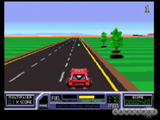 There really hasn't been a decent home version of this game until Midway's
Arcade Treasures, so for the sake of arguement, I'm sticking with the arcade
version. The best way to describe this game is Spy Hunter with a new prespective,
and set in the future. It's not a complex game, but then again, what arcade game
is. Fun in it's own right, and a definite arcade classic.
There really hasn't been a decent home version of this game until Midway's
Arcade Treasures, so for the sake of arguement, I'm sticking with the arcade
version. The best way to describe this game is Spy Hunter with a new prespective,
and set in the future. It's not a complex game, but then again, what arcade game
is. Fun in it's own right, and a definite arcade classic. |
  |
Tetris Attack
[Nintendo - Super NES - 1996]
 Lord, I had an unhealthy addiction to this game when I bought it in the summer
of 96 (of course, on the day I bought it, there was a HUGE blackout in southern
California). Tetris Attack was a puzzle game that got better with each play,
as you figured out how to create better combos and chains. The Endless mode was
pretty much the heart of the game, where you just keep playing until you crap
out. Of course, that could take damn-near a half-hour. Then there's the stage,
puzzle and VS. mode. It was a fully-loaded puzzler. They part that sucks though,
is that there was no battery backup to save scores or progress. Hopefully,
Nintendo will release the Puzzle Collection in the states, which includes this
game, but in the name of Panel De Pon.
Lord, I had an unhealthy addiction to this game when I bought it in the summer
of 96 (of course, on the day I bought it, there was a HUGE blackout in southern
California). Tetris Attack was a puzzle game that got better with each play,
as you figured out how to create better combos and chains. The Endless mode was
pretty much the heart of the game, where you just keep playing until you crap
out. Of course, that could take damn-near a half-hour. Then there's the stage,
puzzle and VS. mode. It was a fully-loaded puzzler. They part that sucks though,
is that there was no battery backup to save scores or progress. Hopefully,
Nintendo will release the Puzzle Collection in the states, which includes this
game, but in the name of Panel De Pon. |
  |
Ikaruga
[Atari - Nintendo Gamecube - 2003]
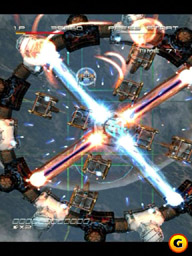 We should thank Atari (Infogrames) for even bringing this title to the US.
What started out as a cult arcade hit in Japan, ended up being ported to the Dreamcast
in Japan, and then later to the Gamecube. While this may be the only scrolling arcade
shooter the Gamecube will see, thank god it's a good one. Ikaruga is a game
that requires the skills to pay the bills, you need to know when to switch from
black to white to keep the chain going. Ikaruga is also a very tough shooter.
While it's not long, it's the hardest 5 stages anyone will ever go through,
with showers of bullets and lasers ready to split your ship in two. Ikaruga
is also an imprtant release, because it tells the industry that arcade shooters
are far from dead.
We should thank Atari (Infogrames) for even bringing this title to the US.
What started out as a cult arcade hit in Japan, ended up being ported to the Dreamcast
in Japan, and then later to the Gamecube. While this may be the only scrolling arcade
shooter the Gamecube will see, thank god it's a good one. Ikaruga is a game
that requires the skills to pay the bills, you need to know when to switch from
black to white to keep the chain going. Ikaruga is also a very tough shooter.
While it's not long, it's the hardest 5 stages anyone will ever go through,
with showers of bullets and lasers ready to split your ship in two. Ikaruga
is also an imprtant release, because it tells the industry that arcade shooters
are far from dead. |
  |
Burnout
[Acclaim - PS2/Cube/Xbox - 2001/2002]
 With the simulation-like racers on the rise, pure arcade racers seem
to be a dying breed. But Criterion Games changed that with one car wreck after
another with Burnout. While not the most original game, Burnout's big draw was
the excessive glorification of automobile accidents. It's physics and controls
were tight, as well, providing nothing but pure racing satisfaction. While the
game did come up a little short on longevity, I sure did squeeze every drop the
game had to offer.
With the simulation-like racers on the rise, pure arcade racers seem
to be a dying breed. But Criterion Games changed that with one car wreck after
another with Burnout. While not the most original game, Burnout's big draw was
the excessive glorification of automobile accidents. It's physics and controls
were tight, as well, providing nothing but pure racing satisfaction. While the
game did come up a little short on longevity, I sure did squeeze every drop the
game had to offer. |
  |
Halo
[Microsoft - Xbox - 2001]
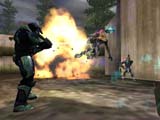 While Halo doesn't really change the whole concept of FPS games, it does refine
the genre. The title that made the Xbox, literally, Halo is a well crafted FPS
that offers some strategy with it' mindless gunplay. Not since GoldenEye have we seen
a FPS this good or this praised. I wish the vehicle controls were better implemented,
but this is still great for one player or a group of four.
While Halo doesn't really change the whole concept of FPS games, it does refine
the genre. The title that made the Xbox, literally, Halo is a well crafted FPS
that offers some strategy with it' mindless gunplay. Not since GoldenEye have we seen
a FPS this good or this praised. I wish the vehicle controls were better implemented,
but this is still great for one player or a group of four. |
  |
Excitebike
[Nintendo - NES - 1986]
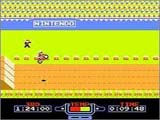 While this game is very archaic today, when copared to such entries as
Freekstyle and MTX Mototrax, there's still a fun charm about the game. It's fun
to take on those jumps against opponents, and create your own dirt courses,
but there was also that bit of strategy of not pushing your dirtbike to
overheating.
While this game is very archaic today, when copared to such entries as
Freekstyle and MTX Mototrax, there's still a fun charm about the game. It's fun
to take on those jumps against opponents, and create your own dirt courses,
but there was also that bit of strategy of not pushing your dirtbike to
overheating. |
  |
Super Monkey Ball
[Sega - Nintendo Gamecube - 2001]
 As one of the launch titles for the Gamecube system, Monkey Ball may have
emerged as one of those games you never knew you wanted. With over 60 insanely difficult
stages to play through, and a great multiplayer mode to boot, this game really
knew how to show it's longevity.
As one of the launch titles for the Gamecube system, Monkey Ball may have
emerged as one of those games you never knew you wanted. With over 60 insanely difficult
stages to play through, and a great multiplayer mode to boot, this game really
knew how to show it's longevity. |
  |
Tony Hawk's Underground
[Activision - PS2/Cube/Xbox - 2003]
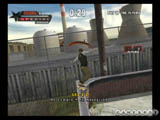 While this game is still relatively new, this entry can really apply to
the entire THPS series, as it was hard to pick just one. Underground does
stand out as the best, though, as it provides a very rich and in-depth
experience to what is usually a pretty shallow genre in some cases. For the
series, it's hard not to give recognition to it, as for not this game,
we wouldn't have other extreme sports entries, such as BMX, inline skating,
surfing and so forth. The THPS series really established the extreme sports
genre.
While this game is still relatively new, this entry can really apply to
the entire THPS series, as it was hard to pick just one. Underground does
stand out as the best, though, as it provides a very rich and in-depth
experience to what is usually a pretty shallow genre in some cases. For the
series, it's hard not to give recognition to it, as for not this game,
we wouldn't have other extreme sports entries, such as BMX, inline skating,
surfing and so forth. The THPS series really established the extreme sports
genre. |
  |
Mortal Kombat II
[Acclaim - Super NES - 1994]
 What a difference a year makes. After seeing how many more copies of the
original MK sold on the Genesis due to the inclusion of blood and gore, this
really made Nintendo re-examine it's stance on what content should be allowed
in games. By some sort of miracle, the Super NES port of MK II had all of
the glorious blood and gore the arcade version had. Not only that, the Super NES
version of MK II turned out to be the best and most faithful version of the
arcade game. After MKII, we really have yet to see a great MK game, up until
Mortal Kombat Deadly Alliance in 2002. If it weren't for the inclusion of the
graphic violence in the Super NES version of MKII, Nintendo would have lost the
console race long ago.
What a difference a year makes. After seeing how many more copies of the
original MK sold on the Genesis due to the inclusion of blood and gore, this
really made Nintendo re-examine it's stance on what content should be allowed
in games. By some sort of miracle, the Super NES port of MK II had all of
the glorious blood and gore the arcade version had. Not only that, the Super NES
version of MK II turned out to be the best and most faithful version of the
arcade game. After MKII, we really have yet to see a great MK game, up until
Mortal Kombat Deadly Alliance in 2002. If it weren't for the inclusion of the
graphic violence in the Super NES version of MKII, Nintendo would have lost the
console race long ago. |
  |
Soul Calibur II
[Namco - Nintendo Gamecube - 2003]
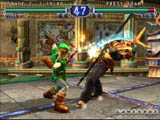 Going from one fighting game to another, we now are at SCII. But why the GC
version? Weren't all versions of SCII the same? Not really, as each version of
SCII had a special character. The GC version had the best one, by having Link
as one of the fighters. But despite the special character, SCII is one of the
most polished and elegant games there are. While it doesn't share the same
complex designs of other fighting games, the level of class this game has makes up
for it. Plus, it has a pretty good story mode.
Going from one fighting game to another, we now are at SCII. But why the GC
version? Weren't all versions of SCII the same? Not really, as each version of
SCII had a special character. The GC version had the best one, by having Link
as one of the fighters. But despite the special character, SCII is one of the
most polished and elegant games there are. While it doesn't share the same
complex designs of other fighting games, the level of class this game has makes up
for it. Plus, it has a pretty good story mode. |
  |
Sonic The Hedgehog
[Sega - Genesis - 1991]
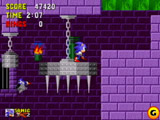 Sonic was Sega's answer to Nintendo's own Mario franchise, and it paid
off for them pretty well. Sonic The Hedgehog really made me want to own
a Genesis back in the day, but it was really one of the only Genesis
games I liked out of the whole lineup. Sonic was a different type of platformer
from the Mario series. Each stage had at least one extra path, so each time you
play, you can try a new route. Plus, there were some skills in that game that were
different from the Mario games, such as rolling in a ball to break through walls
at a high speed. The only thing I don't like about this game is it's soundtrack,
I just don't think it's as memorable as Sonic 2's.
Sonic was Sega's answer to Nintendo's own Mario franchise, and it paid
off for them pretty well. Sonic The Hedgehog really made me want to own
a Genesis back in the day, but it was really one of the only Genesis
games I liked out of the whole lineup. Sonic was a different type of platformer
from the Mario series. Each stage had at least one extra path, so each time you
play, you can try a new route. Plus, there were some skills in that game that were
different from the Mario games, such as rolling in a ball to break through walls
at a high speed. The only thing I don't like about this game is it's soundtrack,
I just don't think it's as memorable as Sonic 2's. |
|